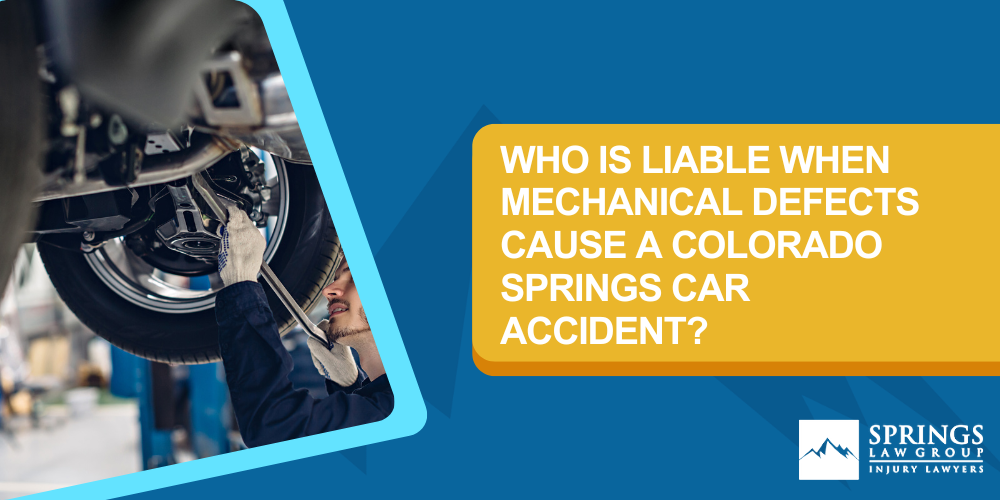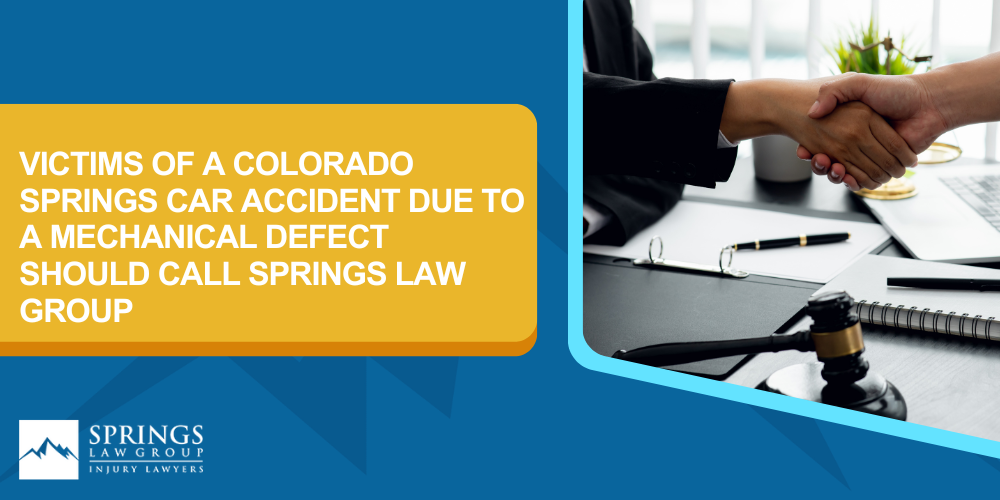Who is Liable When Mechanical Defects Cause a Colorado Springs Car Accident?

There are potentially many causes of a car accident. Most people initially think of causes attributable to one person’s conduct, such as speeding, driving drunk, or making a dangerous left turn. But some causes of vehicle wrecks may be due to mechanical defects or equipment failures of the vehicle. This includes faulty brakes, tire blowouts, or headlights out. These defects could result in very serious auto accidents which cause significant personal injury or wrongful death.
After a Colorado Springs car accident, a person may blame his or her car for causing the subject accident and your personal injuries. In fact, many times someone who caused a motor vehicle crash may be embarrassed and blame his or her vehicle anyway. In these instances, one may be left wondering who is actually at fault for a vehicle’s defect which causes a car crash.
Colorado statutory and common law (judge-made law) have this well-addressed, allowing a victim of a car accident to recover from the person who owned or who operated the defective vehicle. The law has evolved to require owners and/or operators of motor vehicles to be responsible for their vehicle’s maintenance, mandating that such persons keep vehicles in proper working condition free of dangerous defects.
But what defects may apply? Here are some of the most common claims and the applicable law:
NOT a Defense to a Car Crash: “My Brakes Failed!”
If a defendant-driver who causes a crash and claims that his or her brakes stopped working, whether or not that is true, it is likely that he or she will be liable. This is because Colorado Revised Statutes (CRS) section 42-2-223 requires that “[e]very motor vehicle . . . when operated upon a highway shall be equipped with brakes adequate to control the movement of and to stop and hold such vehicle, including two separate means of applying the brakes, each of which means shall be effective to apply the brakes to at least two wheels.” This law still does apply to motorcycles, but the requirement only applies to one wheel and not two.
Therefore, this is not an excuse as the driver and owner of the vehicle are responsible for working brakes.
NOT a Defense to a Car Crash: “My Headlights Didn’t Work!”
Under CRS section 42-4-204, all motorists are required to use their headlights in certain conditions including at night, unfavorable atmospheric conditions, and when vehicles, persons, or the highway is not visible for at least one thousand (1,000) feet ahead. If headlights are not in proper working order and unable to be used, the driver or the owner may be liable.
NOT a Defense to a Car Crash: “My View Was Blocked by Cargo or a Passenger”
If a defendant-driver that causes a car crash claims that he or she was transporting cargo in his or her car and could not see out the back or sides, or that passengers in the vehicle were in the way of the driver’s view, this is in direct violation with CRS section 42-4-201. This section requires that “[n]o person shall drive a vehicle when it is so loaded or when there are in the front seat such number of persons exceeding three, as to obstruct the view of the driver to the front or sides of the vehicle . . . [and] [n]o vehicle shall be operated upon any highway unless the driver’s visions through any glass equipment is normal and unobstructed.” If a driver’s view is obstructed and causes your crash, you may have a valid claim.
NOT (usually) a Defense to a Car Crash: “My Tire Blew Out and Caused the Crash!”
Proper tires are governed by CRS section 42-4-228, and require that “[n]o person shall drive or move a motor vehicle on any highway unless such vehicle is equipped with tires in safe operating condition . . . .” Tires that are “unsafe” are tires that have:
- Any bump, bulge, or knot affecting the tire structure;
- A break which exposes a tire body cord or is required with a boot or patch;
- Inadequate tread depth; or
- Any other conditions “as may be reasonably demonstrated to render it unsafe.”
If a tire has these characteristics and causes a Colorado Springs car accident, the owner or driver of the care may be liable for the crash and any resulting injuries caused by the crash. However, if it is proven that there may be another cause of the tire blowout, such as defectively manufactured tires or roadway damage (potholes) which were unavoidable, some liability may be attributed to a different entity. While it is likely NOT a “complete” defense to a car crash, it may be a partial defense.
Victims of a Colorado Springs Car Accident Due to a Mechanical Defect Should Call Springs Law Group

It may be frustrating after a car crash where you are hurt to hear the other driver claim his or her car caused the crash and it was not his or her fault. Here at Springs Law Group, we know that drivers and owners of vehicles on the road are responsible or their vehicles. When a mechanical or equipment defect causes your crash, we will work hard to hold them accountable and protect your rights to compensation.
